Dec. 7, 2014 7:33 AM ET
by: Pater Tenebrarum
Possible Side-Effects of Plunging Commodity Prices - A Look at Russia
One of our readers wrote to us with a question on a topic that will surely be of interest to a wider audience. Here is what he asked:"As FX reserves dwindle, surely there is some potential that Russia may be forced seller of Gold? I understand your views re gold market, but would be most interested to hear your thoughts on the possible impact? Are there other options? Talk of gold backed RUB, default on USD debts, etc."It is clear that a number of major oil producers are in severe trouble. However, Russia's central bank has actually increased its gold reserves in recent months. It is now the world's 5th largest official holder of gold, after increasing its stock pile to 1,150 tons in September (the most recent data available).
To this it must be kept in mind that Russia itself is a major producer of gold, the third largest in the world in fact, mining about 250 tons per year. The central bank is involved in the marketing of this gold, acting as an intermediary for producers. Still, in spite of increasing its gold reserves quite a bit, they still only represent about 10% of Russia's total reserves. Here is by the way a chart of gold in ruble terms:
(click to enlarge)
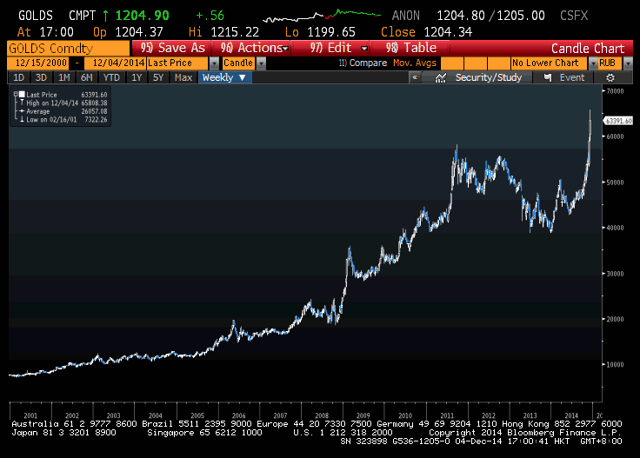
In ruble terms, gold is at a new all-time high.
So why has Russia's central bank actually accelerated its gold buying (i.e., has retained more of the gold it markets for local producers than normal) in the face of increasing pressure on its foreign exchange reserves? As one commentator remarked:
"From the perspective of a sovereign which is concerned about aspects of geopolitical risk, it makes sense that they would have a bias toward physical gold," Brian Lucey, a finance professor at Trinity College Dublin and formerly an economist for the Central Bank of Ireland, said today by phone. With lower gold prices, Russia may have viewed it "as good a time as any to pick it up," he said.Russian officials think about this exactly as Alan Greenspan does. When Greenspan was once asked why the US Treasury shouldn't sell its remaining gold reserves, he pointed out that in extremis, such as in times of war, gold is absolutely certain to remain a viable means of payment that will be accepted by everybody. He cited the experience of Germany during WW2 to buttress this claim empirically.
We would also note that while Russian reserves have been under pressure due to capital flight and misguided attempts to defend the ruble's exchange rate with forex market interventions, its current account has been consistently positive since the mid 1990s:
(click to enlarge)
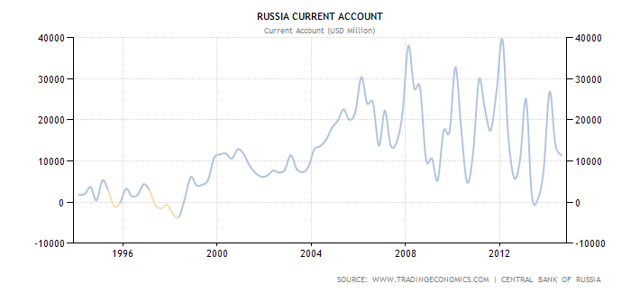
Russia's current account remains in surplus
The current account surplus may come under pressure as well in light of plunging oil prices, but Russia has used the years of plenty to build up a "rainy day" fund amounting to about $470 billion in addition to its central bank reserves. The current situation is presumably precisely what Russia's government had in mind when it did that.
Note as an aside that the Russian government is in a very strong fiscal position - the kind most developed nations can only dream of. This is now also bound to deteriorate somewhat (although not as much as one might expect, as the ruble price of oil has barely declined), but Russia certainly still has a lot of fiscal flexibility:
(click to enlarge)
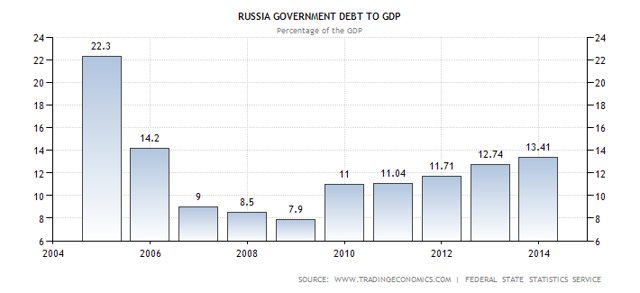
Russia's public debt to GDP ratio. The government is nearly debt free. As an aside, there is a flat personal income tax rate of just 13% in Russia.
(click to enlarge)
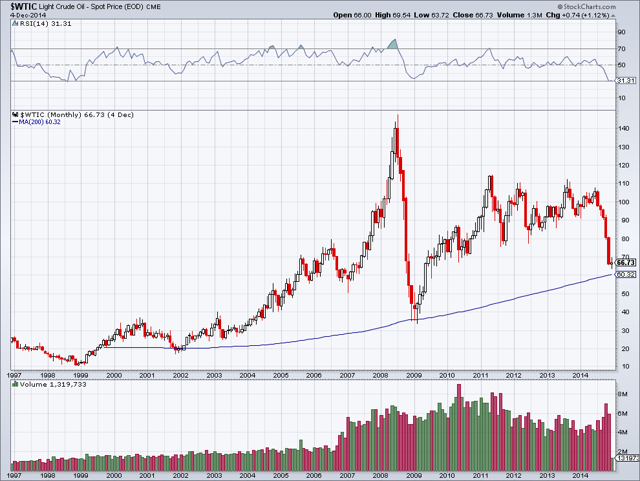
WTIC crude oil, monthly - as can be seen, prices are now back to where they already were in 2005-2006, pressuring all major oil producers.
Readers may also recall that Mr. Putin has recently been persuaded by the free-market oriented faction of Prime Minister Medvedev that he should finally do something about official corruption, as a means to counter the effects of economic sanctions (see: "Russia Moves Toward Increasing Economic Freedom" for details). Putin agreed, as he evidently understands that Russia's economy needs every bit of help it can get. We recently had official confirmation of the new approach in Putin's annual address to the Duma. Here are what we believe are the most important points:
"I propose a full amnesty for capital returning to Russia. I stress, full amnesty. Of course, it is essential to explain to the people who will make these decisions what full amnesty means. It means that if a person legalises his holdings and property in Russia, he will receive firm legal guarantees that he will not be summoned to various agencies, including law enforcement agencies, that they will not "put the squeeze" on him, that he will not be asked about the sources of his capital and methods of its acquisition, that he will not be prosecuted or face administrative liability, and that he will not be questioned by the tax service or law enforcement agencies.
[…]
It is essential to lift restrictions on business as much as possible, free it from intrusive supervision and control. I said intrusive supervision and control. I will consider this in more detail later. I propose the following measures in this regard.
Every inspection should become public. Next year, a special register will be launched, with information on what agency has initiated an inspection, for what purpose, and what results it has produced. This will make it possible to stop unwarranted and, worse still, 'paid to order' visits from oversight agencies. This problem is extremely relevant not only for business, but also for the public sector, municipal institutions and social NGOs.
Finally, it's crucial to abandon the basic principle of total, endless control. The situation should be monitored where there are real risks or signs of transgression. You see, even when we have already done something with regard to restrictions, and these restrictions seem to be working well, there are so many inspection agencies that if every one of them comes at least once, then that's it, the company would just fold. In 2015, the Government should make all the necessary decisions to switch to this system, a system of restrictions with regard to reviews and inspections.
Concerning small business, I propose establishing 'holidays from inspections'. If a company has acquired a good reputation and if there have not been any serious charges against it for three years, then for the next three years it should be exempted from routine inspections by government or municipal supervisory agencies. Of course, this does not apply to emergencies, when there is a danger to people's health and life.
Business people talk about the need for stable legislation and predictable rules, including taxes. I completely agree with this. I propose to freeze the existing tax parameters as they are for the next four years, not revisit the matter again, not change them.
Meanwhile, it is important to implement the decisions that have already been made to ease the tax burden. First of all, for those who are just setting up their operations. As we have agreed, two-year tax holidays will be provided to small businesses registering for the first time. Production facilities that are starting from scratch will be entitled to the same exemptions."
It should be obvious that if this program of liberalization is successfully implemented, it will do a lot to halt capital flight - more than the capital repatriation amnesty would do by itself.
However, the two proposals go hand in hand: if owners of "flight capital" can be persuaded that official corruption is going to be successfully tackled and state interference with private enterprise will be significantly reduced, they have a big incentive to bring some of their funds back.
We would conclude from all this that the danger that Russia will become a forced seller of official gold reserves is fairly low for the time being.
Venezuela under Great Pressure
Socialist Venezuela is under far greater pressure to sell or swap some of its official gold holdings. We recently showed this chart of the black market Bolivar rate, which is a reflection of the dire straits the government finds itself in:
(click to enlarge)
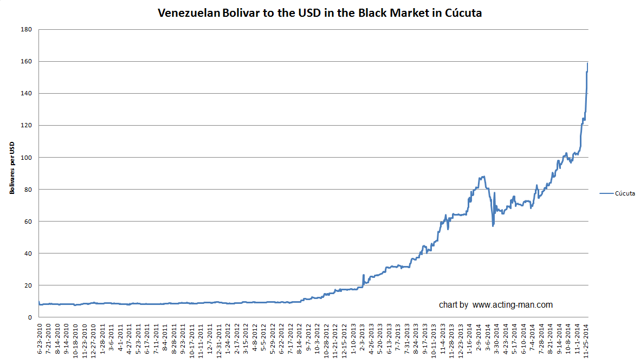
The bolivar has collapsed in the black market in Cucuta (a border town with a flourishing foreign exchange trade).
Under both Nicolas Maduro and his predecessor Hugo Chavez, plenty of welfare spending and other government handouts have been funded with the country's oil income. This policy was combined with massive inflation of the local currency, fixed exchange rates and price controls. As a result, there are now shortages of goods as well as a growing shortage of foreign exchange reserves. The government is increasingly unable to pay for imports and foreign debt coming due concurrently. Its social spending has become unaffordable too. So there is a good chance that Venezuela will eventually be forced to sell some of its official gold holdings.
However, as we always point out, such news can at most have a short-term psychological impact on the gold market. The gold market is so big that Venezuela's potential sales won't even be noticed.
Besides, it should be obvious by now that central bank gold buying in recent years has not helped the gold price one bit - QED.
Conclusion:
A few nations may indeed be forced to sell some of their official gold reserves as a result of plunging oil prices. It seems, however, not likely at this juncture that Russia will be one of them.
Moreover, the impact on the gold market should be quite limited. We will discuss the other parts of the reader question above next week (i.e., the possibility of introducing a gold-backed ruble and the possibility of defaults on USD denominated debt).
Charts by: StockCharts, Bloomberg, BigCharts, Tradingeconomics, acting-man/dolartoday

0 comments:
Publicar un comentario